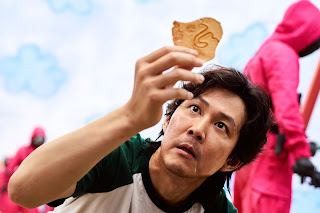Koreans React to Global Success of Squid Game
The Korean Netflix drama series “Squid Game” currently tops the global rankings on Netflix and is the first Korean drama to claim the No. 1 spot in the U.S. However, reactions from the locals in Korea have been a mixture of hot and cold, so today, we hit the streets of Seoul to find out what Koreans think of Squid Game and its global success.
Squid Game
Hundreds of cash-strapped players accept a strange invitation to compete in children's games. Inside, a tempting prize awaits — with deadly high stakes.
North Korean website says Squid Game reflects South Korea's 'beastly' society
Squid Game became a worldwide sensation for Netflix when it was released in September. PHOTO: NETFLIX
A North Korean propaganda website said on Tuesday (Oct 12) that the international Netflix hit Squid Game exposes the reality of South Korean capitalist culture where "corruption and immoral scoundrels are commonplace".
North Korea's Arirang Meari site cited unnamed South Korean film critics as saying that the TV series shows an "unequal society where moneyless people are treated like chess pieces for the rich".
Made in South Korea, the nine-part thriller, in which cash-strapped contestants play deadly childhood games in a bid to win 45.6 billion won (S$52 million), became a worldwide sensation for Netflix when it was released in September.
‘Squid Game’ Proves Netflix’s Biggest Advantage Is Foreign Language TV
If asked to summarize pop culture over the last couple weeks, I would pick six words.
“Squid Game.” “Squid Game.” “Squid Game.”
The Korean show is on pace to be the biggest hit in the history of Netflix. It is the most popular show in more than 90 countries, unprecedented for a Korean show (and really any TV show). It’s a meme on TikTok. It’s a Halloween costume. It has come up at least twice in conversation every day this week.
It will be easy to dismiss “Squid Game” as some kind of fluke or aberration, just the latest quirky show that Netflix turned into a viral smash. Remember when “Tiger King” was all the rage for a few weeks?
Haven’t Watched ‘Squid Game’? Here’s What You’re Not Missing
HoYeon Jung in a scene from the hit South Korean Netflix series “Squid Game.” Our critic calls the show’s outré violence "empty, bloody calories.”Credit ... Netflix
If you know that you’re supposed to have watched Netflix’s South Korean puzzle box “Squid Game” by now, but you’ve been lucky or prudent enough not to, here’s some of what you’re missing.
There’s the eye-catching — though not especially interesting — production design and costuming, glimpses of which you may have caught on social media. Escher-like stairways and over-scaled, toy-chest décor, along with the monochromatic jumpsuits and forbidding masks, recall dystopian favorites like “The Prisoner,” “The Handmaid’s Tale” and Netflix’s own “Money Heist.” Their meme-readiness has clearly been a factor in the startling omnipresence of the series since its Sept. 17 premiere.
A second season has not been announced, but betting against it would be as unwise as trusting one of the show’s desperate schemers in a game of marbles.
Inside the real kids' games in 'Squid Game'
A scene from "Squid Game" on Netflix.Youngkyu Park / Netflix
In the South Korean hit show “Squid Game,” dark twists play out against a backdrop of childhood games. In the nine-episode Netflix series, 456 players fight to the death in a series of games for a cash reward of $38 million. The show mixes deeply entrenched issues of poverty, class anxiety and income inequality with nostalgic Korean childhood pastimes. Some of the scenes have sparked global interest in the traditional folk games on the show, and experts share some background below.
In episode one, the players participate in a version of the game Red Light, Green Light. A giant robot doll, modeled after Cheolsoo and Younghee — children's characters in Korean textbooks — allows players to move only when they hear her singsong voice saying “Mugunghwa flower has blossomed”; otherwise they are shot. The rhythmic folk game has different variations, substituting "mugunghwa flower" with other words. Mugunghwa, or the rose of Sharon, is Korea’s national flower and is also in the country’s national anthem.
“The flower is particularly significant for the once-colonized Koreans because it blooms and blooms, seemingly forever,” said Chan E. Park, a professor emeritus at Ohio State University, referring to the country under Japanese colonial rule from 1910 to 1945. “Its symbolism is resilience — ‘Korea forever,’ so to speak.”
Children Spotted Playing Squid Game ‘Red Light, Green Light’
If you’ve watched Netflix’s latest hit series Squid Game, you’d know that it’s not exactly a show meant for kids.
Apart from the honeycomb which kids would surely drool at, the blood, guts, and gore would be better left for older eyes.
So, it was, therefore, a little surprising to hear one of the games being played by some of our young ones right here in Singapore. And if you didn’t know what the game was all about, you’d almost think it was cute.
Squid Game 오징어 게임
Squid Game (Korean: 오징어 게임; RR: Ojing-eo Geim) is a South Korean survival drama television series streaming on Netflix. Written and directed by Hwang Dong-hyuk, it stars Lee Jung-jae, Park Hae-soo, Wi Ha-joon, Jung Ho-yeon, O Yeong-su, Heo Sung-tae, Anupam Tripathi, and Kim Joo-ryoung. The series, distributed by Netflix, was released worldwide on September 17, 2021.
The series centers on a contest where 456 players, drawn from different walks of life but each deeply in debt, play a set of children's games with deadly penalties for losing for the chance to win a ₩45.6 billion prize.[a] Hwang had conceived of the idea based on his own economic struggles early in life as well as the class disparity within South Korea. Though initially scripted in 2008, Hwang had been unable to find a production to support the script until Netflix around 2019 found interest as part of their drive to expand their foreign programming offerings. Hwang wrote and directed all nine episodes himself.
Squid Game received critical acclaim and attracted international attention. Within a week of its release, it became one of Netflix's most-watched programs in several regional markets.








